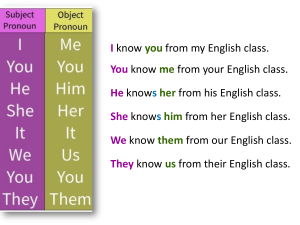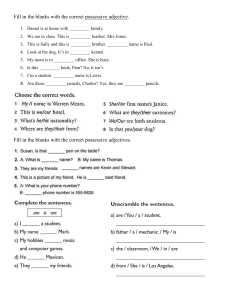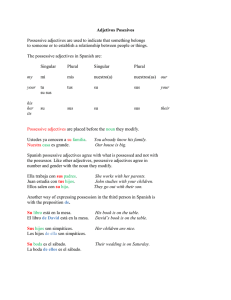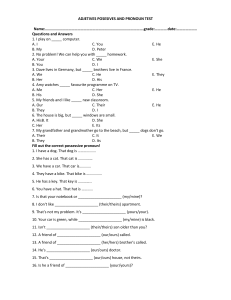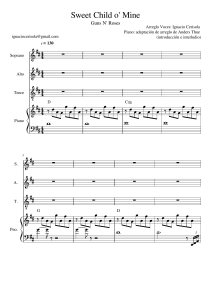4.7 Adjectives Part 3: Who Owns What Language Lesson
Anuncio
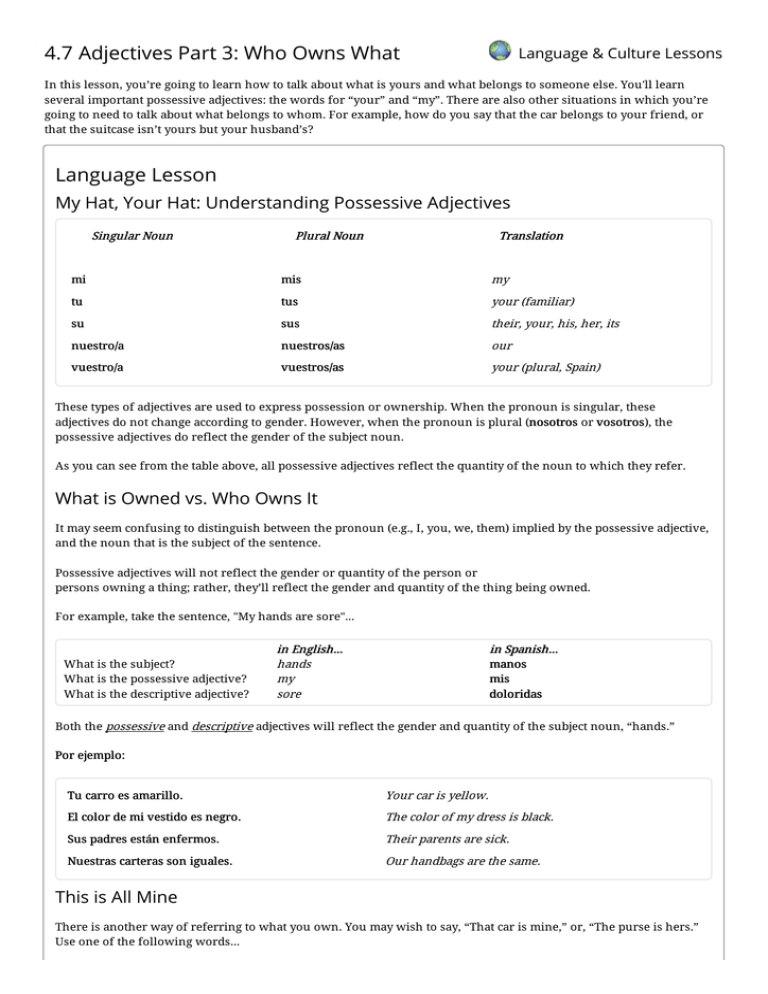
4.7 Adjectives Part 3: Who Owns What Language & Culture Lessons In this lesson, you’re going to learn how to talk about what is yours and what belongs to someone else. You'll learn several important possessive adjectives: the words for “your” and “my”. There are also other situations in which you’re going to need to talk about what belongs to whom. For example, how do you say that the car belongs to your friend, or that the suitcase isn’t yours but your husband’s? Language Lesson My Hat, Your Hat: Understanding Possessive Adjectives Singular Noun Plural Noun Translation mi mis my tu tus your (familiar) su sus their, your, his, her, its nuestro/a nuestros/as our vuestro/a vuestros/as your (plural, Spain) These types of adjectives are used to express possession or ownership. When the pronoun is singular, these adjectives do not change according to gender. However, when the pronoun is plural (nosotros or vosotros), the possessive adjectives do reflect the gender of the subject noun. As you can see from the table above, all possessive adjectives reflect the quantity of the noun to which they refer. What is Owned vs. Who Owns It It may seem confusing to distinguish between the pronoun (e.g., I, you, we, them) implied by the possessive adjective, and the noun that is the subject of the sentence. Possessive adjectives will not reflect the gender or quantity of the person or persons owning a thing; rather, they’ll reflect the gender and quantity of the thing being owned. For example, take the sentence, "My hands are sore"... What is the subject? What is the possessive adjective? What is the descriptive adjective? in English... hands my sore in Spanish... manos mis doloridas Both the possessive and descriptive adjectives will reflect the gender and quantity of the subject noun, “hands.” Por ejemplo: Tu carro es amarillo. Your car is yellow. El color de mi vestido es negro. The color of my dress is black. Sus padres están enfermos. Their parents are sick. Nuestras carteras son iguales. Our handbags are the same. This is All Mine There is another way of referring to what you own. You may wish to say, “That car is mine,” or, “The purse is hers.” Use one of the following words... Singular Plural Translation mío/a míos/as my, mine tuyo/a tuyos/as your, yours (familiar) suyo/a suyos/as his, her, hers, its, your, yours nuestro/a nuestros/as our, ours vuestro/a vuestros/as your, yours (Spain) Por ejemplo: El carro es mío. The car is mine. La cartera es suya. The handbag is hers. Las manzanas son nuestras. The apples are ours. Just like an ordinary adjective, you must match the gender (masculine or feminine) and quantity (singular or plural) of the stressed possessive adjective to the noun. You can also use one of these words to replace the noun. Look at the difference between the following sentences: ¿Es este asiento suyo? Is this seat yours? No quiero usar el tuyo. I don't want to use yours. In the first sentence, "yours" is acting as an adjective. In the second sentence, "yours" is acting as a pronoun. To use mío, tuyo, suyo, etc. as pronouns, all you have to do is add an el, la, los, or las in front. For example, if you want to use "mine" as a noun (as in, "Mine is the best," or, "You want mine"), you will use el mío, la mía, los míos, or las mías. Por ejemplo: ¿Tienes tú los libros de la biblioteca? Do you have the books from the library? Sí, y también tengo los míos. Yes, and I have mine too. ¿Mi casa está muy desordenada, y la tuya? My house is very messy, and yours? La mía está muy limpia. Mine is very clean. ¡Las flores en tu jardín están todas secas! The flowers in your garden are all dry! ¿Las tuyas también, no? Yours are too, aren’t they? Culture La Navidad - Christmas As part of Christian tradition, La Navidad Christmas is the annual family celebration that takes place on December 25th each year, to commemorate the birth of Jesus Christ. But unlike many Christian Anglo-Saxon countries, gifts are not given out on this date, but on January the 5th at night, or the 6th. The scripture says that this the day when the Three Wise Men arrived in Belen with presents for the new savior. Chile is the exception - they give gifts on Christmas Eve. Los Tres Reyes Magos (The Three Wise Men) In Spain and most Latin American countries, Christmas is a time for familia family, with the preoccupation of presents reserved for the 5th or 5th of January. On Nochebuena Christmas Eve, most Catholics attend mass and children re-enact the nativity scene dressed like shepherds, while everyone sings Christmas canciones songs. A delicious meal with multiple dishes is served. Latin American families are big, and every cousin, uncle and guest cooks something. This way, in a single event you can have your mom´s special turkey, a slice of uncle Pedro´s BBQ pork, and granny´s special condensed milk dessert. It's a fun, crowded and sometimes chaotic event that everyone looks forward to celebrating. Libros Media Ltd. - Copyright 2004-2014 USA: 10660 Page Avenue, PO Box 1261, Fairfax, VA 22038, USA | Phone: 703-349-0452 Asia/Pacific: 2-1008 Ferry Road, Woolston, Christchurch 8023, New Zealand | Phone: +64-3-384-6350
